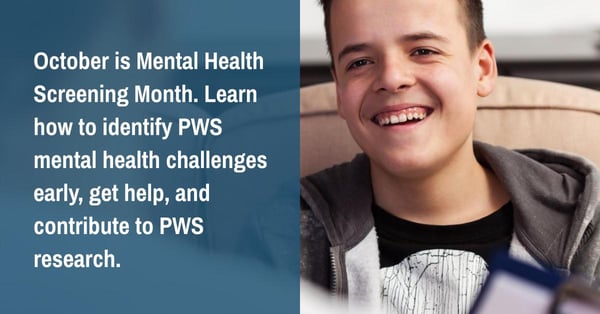October is Mental Health Screening Month, and we're encouraging our PWS community to learn more about how to identify mental health challenges early.
Mental health issues in PWS are a significant challenge for many people with Prader-Willi syndrome. As with behavioral challenges, they can have a significant impact on quality of life and independence for both the person with PWS and their family. People with PWS are at a higher risk of developing depression, bipolar disorder and psychotic symptoms particularly while in their teens and young adulthood.

Identifying Mental Health Issues in PWS
To identify potential mental health issues in PWS, look for changes versus the person's usual behaviors:
- Eating – Are they less interested in food or consuming less food than usual?
- Behavior – Are they displaying increased agitation or aggression? Are they more talkative or more withdrawn than usual?
- Sleep – Are they sleeping less, or has there been a change in sleeping pattern, such being as up more at night or earlier in the morning, or napping more?
- Grooming – Has there been a loss of interest in self-grooming habits such as changing clothes, brushing or combing hair, brushing teeth, and showering?
If you notice any of the above changes, if they're not related to physical illness and have continued for more than 1-2 weeks, it is recommended that you take the person with PWS for an assessment. Start with their primary care doctor or mental health provider, and provide them with information about mental health issues in PWS.
For more information on the mental health challenges in PWS, visit our PWS Mental Health Guidebook online >>
Help Us Learn More About Mental Health Challenges in PWS
Research has shown that people with PWS are at higher risk for specific mental health challenges, including “affective disorders” (depression, bipolar disorder) and psychotic symptoms, but there is much more we need to know.
The Psychological and Mental Health Survey in the Global PWS Registry only takes a few minutes to complete and asks if your loved one has experienced mental health conditions such as anxiety disorder, psychosis, depression, mania, bipolar disorder, etc. If your loved one has experienced any of these conditions, you will also be asked when the condition first began, the severity of the condition at its peak, and its current severity.
Your responses to this survey will help us better understand mental health challenges in PWS and work towards improved treatments. We thank you in advance for your participation and look forward to sharing the results!








